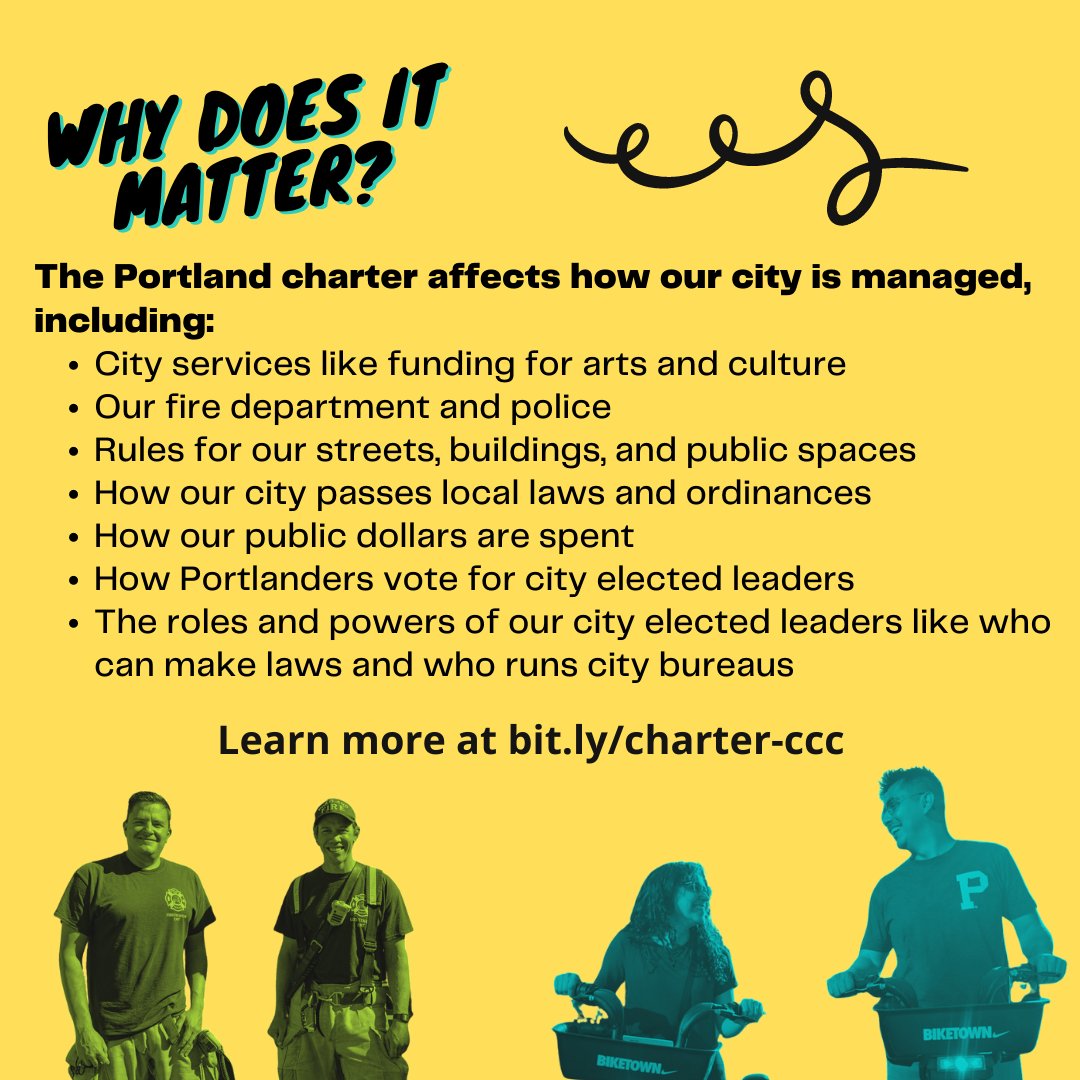Changing Portland’s City Government
Action opportunities:
Sign up for email updates from the City of Portland’s transition team
Sign up for email updates from the Portland United for Change coalition
Background:
On June 14th, 2022, the Portland Charter Review Commission referred a ballot measure to Portland voters (Measure 26-228) under the unified objective of making improvements to our city’s lawmaking body, Portland City Council. The measure changes how Portlanders will vote for city council members, the number and constituency of city council seats, and the job description of the Mayor and city council.
On November 8th, 2022, Measure 26-228 was approved by over 58% of Portland voters. Here is what the measure does:
Allows voters to rank local candidates in order of preference (also known as ranked choice voting). This will allow Portland to elect its city council in just one election instead of having primaries, which historically have much lower turnout than general elections and are therefore less democratic. [Link: learn more about ranked choice voting]
Increases the size of Portland City Council from 5 to 12 representatives, and electing those council members in four new city districts. By electing three members of city council in four districts, voters will have better representation in local decisions and campaigns for office will be incentivized to work together instead of competing. [Link: learn more about multi-member districts paired with ranked choice voting, also known as proportional ranked choice voting].
Moves Portland from a commission form of government to a professional city administrator. Portland is the last big city in the United States that uses a commission form of government wherein each city council member directly oversees a handful of city bureaus delivering services like water, roads, and parks. Cities of Portland’s size typically work much more effectively with one city manager or administrator overseeing all city bureaus. [Link: learn more about the charter reform measure’s new form of government]
The City of Portland is carrying out a two-year transition plan so that Portland voters can use our new election system in November 2024 and start using the new Mayor-Council form of government in January 2025.
What is a City Charter?
A City Charter is a guiding document that establishes a local government’s system and structure. Portland’s Charter determines how the city runs elections, the roles and responsibilities of the city’s elected leaders, and how city bureaus and services are managed.
At least once every 10 years, the City Council appoints 20 Portlanders to a Charter Commission to review the City Charter and recommend changes. The Charter Commission is working to engage Portlanders in a conversation about how our City Charter can best respond to our diverse communities’ needs.
The Coalition of Communities of Color (CCC) partnered with the City of Portland on the design and implementation of community education and engagement activities to meaningfully engage Portland communities in the Charter Review process. The CCC’s primary focus of engagement was to involve Portlanders who have been historically left out of City Hall decision-making, including communities of color, immigrants, refugees, renters, and many more communities.
In 2021 and 2022 the CCC worked with a 12-member collaborative that included The Asian Pacific American Network of Oregon (APANO), Hacienda CDC, IRCO Africa House, Pacific Islander & Asian Family Center, Muslim Educational Trust, Native American Youth & Family Center, Slavic & Eastern European Center, Street Roots, Unite Oregon, Urban League of Portland, Verde, and Next Up.
The CCC and partner organizations led a two-part Charter Review Workshop Series to hear the perspectives of Portlanders about their experiences with the city government and voting system. Participants engaged in small group discussions with trusted community facilitators and shared their opinions, thoughts, and ideas about the barriers they face and aspirations for new systems. The CCC released two reports of the collective findings from community conversations. Check them out below:
Outside of CCC’s formal community engagement role with the Charter Commission, the coalition was also engaged in policy research and building relationships to advance our shared goals for a more equitable city.
Additional Resources
The City of Portland’s transition plan: https://www.portland.gov/transition
Portland United for Change website (Yes on Measure 26-228 campaign): www.portlandunitedforchange.com
Portland Charter Commission website: https://www.portland.gov/omf/charter-review-commission
Sightline Institute’s series on Portland Democracy, exploring options for different kinds of voting systems that the Charter Commission could consider: https://www.sightline.org/series/portland-democracy/
Sightline Institute: “Everything you wanted to know about Portland Charter Review but were too afraid to ask”
City Club of Portland’s report: “New Government for Today’s Portland: Rethinking 100 Years of the Commission System”
City Club of Portland’s report: “New Government for Today’s Portland: Rethinking How we Vote”
City Club of Portland’s “Charter Chat” event series: https://www.pdxcityclub.org/
Metric Geometry and Gerrymandering Group Redistricting Lab’s report: “Analysis of Elections Systems for the Portland, OR City Council”
More Equitable Democracy: “Video presentation on Electoral Methods and Form of Government in Portland”


